Trying to catch a top-level exception from an ASP.NET Core 3 SignalR Hub
It is tricky as I'm using yield return, and you cannot wrap this in a try-catch block. It gives this compiler error:
CS1626 C# Cannot yield a value in the body of a try block with a catch clause
So, how to trap this Exception? It is being trapped internally somewhere and sent to the javascript client. I can't seem to see the exception in the ASP.NET Core middleware pipeline.
// SignalR Hub
public class CrawlHub : Hub
{
public async IAsyncEnumerable<UIMessage> Crawl(string url, [EnumeratorCancellation]CancellationToken cancellationToken)
{
Log.Information("Here");
// Trying to catch this error further up pipeline as
// can't try catch here due to yield return
throw new HubException("This error will be sent to the client!");
// handing off to Crawler which returns back messages (UIMessage objects) every now and again on progress
await foreach (var uiMessage in Crawler.Crawl(url, cancellationToken))
{
// Check the cancellation token regularly so that the server will stop
// producing items if the client disconnects.
cancellationToken.ThrowIfCancellationRequested()
// update the stream UI with whatever is happening in static Crawl
yield return new UIMessage(uiMessage.Message, uiMessage.Hyperlink, uiMessage.NewLine);
}
}
}
Trying to catch an exception so can Log.Fatal(ex) it to serilog
The exception is being passed to the js client.
2019-11-24 08:35:48.636 +00:00 [INF]
2019-11-24 08:35:48.682 +00:00 [INF] Starting up BLC.Website (Program.cs)
2019-11-24 08:35:48.917 +00:00 [INF] Development environment - using developer exception page
2019-11-24 08:35:48.995 +00:00 [INF] Application started. Press Ctrl+C to shut down.
2019-11-24 08:35:48.997 +00:00 [INF] Hosting environment: Development
2019-11-24 08:35:48.998 +00:00 [INF] Content root path: c:\dev\test\BrokenLink\BLC.Website
2019-11-24 08:35:49.138 +00:00 [INF] HTTP GET / responded 200 in 125.315 ms
2019-11-24 08:35:54.652 +00:00 [INF] HTTP GET /scan?urlToCrawl=davemateer.com responded 200 in 34.0029 ms
2019-11-24 08:35:54.820 +00:00 [INF] HTTP POST /crawlHub/negotiate responded 200 in 11.954 ms
2019-11-24 08:35:54.947 +00:00 [INF] Here
Exception not being caught by ASP.NET Core 3 logging.
Program.cs
public class Program
{
public static void Main(string[] args)
{
Log.Logger = new LoggerConfiguration()
//.MinimumLevel.Information() // this is the default
// Suppress framework log noise eg routing and handling
// so we'll see warnings and errors from the framework
.MinimumLevel.Override("Microsoft.AspNetCore", LogEventLevel.Warning)
.Enrich.FromLogContext()
.WriteTo.Console()
.WriteTo.File("log.txt", rollingInterval: RollingInterval.Day)
.CreateLogger();
try
{
Log.Information("");
Log.Information("Starting up BLC.Website (Program.cs)");
CreateHostBuilder(args).Build().Run();
}
catch (Exception ex)
{
Log.Fatal(ex, "Application start-up failed");
}
finally
{
Log.CloseAndFlush();
}
}
public static IHostBuilder CreateHostBuilder(string[] args) =>
Host.CreateDefaultBuilder(args)
.UseSerilog()
// configuring logging for SignalR
.ConfigureLogging(logging =>
{
logging.AddFilter("Microsoft.AspNetCore.SignalR", LogLevel.Warning);
// turn on for connection debugging
//logging.AddFilter("Microsoft.AspNetCore.Http.Connections", LogLevel.Debug);
})
.ConfigureWebHostDefaults(webBuilder =>
{
webBuilder.UseStartup<Startup>();
});
}
Startup.cs
// This method gets called by the runtime. Use this method to add services to the container.
public void ConfigureServices(IServiceCollection services, IWebHostEnvironment env)
{
services.AddRazorPages();
// send errors to the client
services.AddSignalR(options =>
{
if (env.IsDevelopment())
{
options.EnableDetailedErrors = true;
}
});
}
public void Configure(IApplicationBuilder app, IWebHostEnvironment env)
{
if (env.IsDevelopment())
{
Log.Information("Development environment - using developer exception page");
app.UseDeveloperExceptionPage();
}
else
{
Log.Information("Non Development environment - errors go to /Error");
app.UseExceptionHandler("/Error");
// The default HSTS value is 30 days. You may want to change this for production scenarios, see https://aka.ms/aspnetcore-hsts.
app.UseHsts();
}
app.UseHttpsRedirection();
app.UseStaticFiles();
// don't want request logging for static files so put it here in the pipeline
app.UseSerilogRequestLogging();
app.UseRouting();
app.UseAuthorization();
app.UseEndpoints(endpoints =>
{
endpoints.MapRazorPages();
endpoints.MapHub<CrawlHub>("/crawlHub");
});
}
